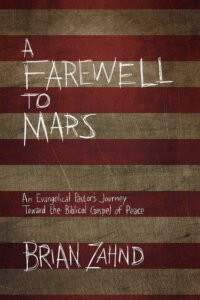
 I cannot overstate my excitement to promote Brian Zahnd’s latest book, A Farewell to Mars. I am passionate about the message of Jesus as it addresses all of life, including politics. I believe the message of Jesus was intensely political. The puzzle for us today is how to work it out in our unique socio-historical context. This is where Zahnd’s book is relevant to a part of the church that is blinded to its addiction to and endorsement of violence. Many others have made the case for peace, and many have done so by appealing to Jesus. Zahnd shares his journey, and in so doing, he subtly exposes the church’s infatuation with a power that is truly impotent to save the world.
I cannot overstate my excitement to promote Brian Zahnd’s latest book, A Farewell to Mars. I am passionate about the message of Jesus as it addresses all of life, including politics. I believe the message of Jesus was intensely political. The puzzle for us today is how to work it out in our unique socio-historical context. This is where Zahnd’s book is relevant to a part of the church that is blinded to its addiction to and endorsement of violence. Many others have made the case for peace, and many have done so by appealing to Jesus. Zahnd shares his journey, and in so doing, he subtly exposes the church’s infatuation with a power that is truly impotent to save the world.
As libertarians we embrace a politics of peace. Non-aggression is our one non-negotiable. We believe that free trade creates mutually beneficial transactions that promote prosperity for all parties involved. As Christians we believe that true individual freedom comes from faith in Jesus. Our commitment to peace is highly personal for us. A Farewell to Mars is about how the message of Jesus applies to human society. Jesus’ world was radically different from ours. He did not address the specific issues that preoccupy us today. Yet everyone who heard the claim “Jesus is Lord” understood that it meant emphatically that Caesar is not! As the saying goes, “Them’s fightin’ words!”
Zahnd expected to write this book when he was 70 years old. It arrived 15 years early when he had three grandchildren (to whom the book is dedicated). His reluctance to write it is evident on its first pages, where in a brief letter to the book itself, he writes, “I had to write you. You wouldn’t let me sleep until you were written.” Every page thereafter is simply thick with passion for the world-changing message of Jesus.Zahnd starts the book confessing his worst sin. It occurred on January 16, 1991, but it was not until 2006 when God whispered to him out of the blue during prayer time. Zahnd wept and repented. “How I reached the point where I could weep over war and repent of any fascination with it is part of what this book is about — it’s the story of how I left the paradigms of nationalism, militarism, and violence as a legitimate means of shaping the world to embrace the radical alternative of the gospel of peace.” He clarifies, however, that the book is mostly about Jesus of Nazareth and his revolutionary ideas about peace. He audaciously claims, “Jesus Christ and his peaceable kingdom are the hope of the world.”
The problem with much of the church is its collusion with the principalities and powers of the world instead of offering an alternative community demonstrating the way of peace. The church appears to have lost its appetite for the things that make for peace. Instead it lusts for the power to control through violence. In short, we believe in Jesus but not in his ideas. According to Zahnd, “If Yeshua had been content to confine himself to the dreamy world of afterlife expectations and had not harbored revolutionary ideas about human social structure, Pilate would have seen little reason to bother with Yeshua, much less crucify him. But Yeshua did have revolutionary ideas. And it was Yeshua’s ideas about an alternative arrangement of the world—an arrangement that might best be called peace—that resulted in his death by state-sponsored execution.”
Zahnd includes a lengthy poem he wrote while traveling home from vacation. Here is a taste:
May we preserve and illuminate,
cry aloud and convict,
but never forget
every empire of man is built upon a lie.
And to stand for truth
and to stand for God
is to stand against the lie the empire is built upon.
A major portion of the book examines how Jesus is the Savior of the world. Zahnd believes that the hope of the world is redemptive and not destructive. We look forward to a New Jersusalem, not to Armageddon. He explains: “Christianity’s first apostles evangelized, not by trying to sign people up for an apocalyptic evacuation, but by announcing the arrival of a new world order.” Easter changed everything. God vindicated the one who exposed the evil of violence. “Once the world came to see Christ’s death upon the cross as an act of cosuffering love and an alternative to violent revenge, it introduced a saving grace that helped mitigate man’s inhumanity to man. Nothing has done more to confer dignity upon the individual person than the Christian doctrine of the incarnation…. The incarnation has, without question, made the world a more humane place by raising the dignity of every individual.” A post-Easter world, then, has radically new possibilities. Humans can choose to relate to one another lovingly because of the cross. Zahnd asks rhetorically if we’ve ever seen a hospital dedicated to Nietzsche or a Voltaire’s children’s home? The point is clear: it is because of Jesus the world has the capacity to abandon its uncaring pagan past.
Those familiar with the work of René Girard will recognize Zahnd’s theological treatment of foundational sin, the origins of scapegoating, and the systems of sacrifice. His contention is that Jesus, the Lamb of God, turned the whole system on its head. To those who look for exceptions to commands such as “Love your enemies” or “Pray for those who persecute you,” Zahnd’s responds, “at some point you have to decide what Jesus did mean with his kingdom imperatives on nonviolence and enemy love. Which is to say, we eventually have to ask ourselves what did Jesus intend and when do we need to turn the other cheek? If our default response to this portion of the Sermon on the Mount is to craft exemptions, we might give the impression that we really don’t believe in Jesus’s ideas of nonviolent resistance and enemy love at all.”
Zahnd then explains that when a society is founded on violence, freedom is just another word for power. Not just any power, but the power to take life, the power to kill. But using the word freedom can be tricky when coupled with nationalism or militarism. Zahnd explains: “If we carefully examine how we use the word freedom, it becomes apparent that we use it to sanction our perceived right to pursue happiness in a self-interested fashion. We want the freedom to arrange the world in such a way that it serves the interest of our own self for our own group. But that is not freedom…. Violence in the name of freedom always circles back to hell. Jesus is the way out. In the midst of our sanctioned practice of collective killing done in the name of freedom, Jesus comes and speaks the truth that will set us free.”
How does this apply to us today? If we repent, what does it mean to follow in the way of Jesus? The road to destruction — that is, the way of violence — is wide. The way of peace is narrow: “To endorse the dominant view that the employment of violence is compatible with Christianity requires no courage at all— that’s just following the crowd. But to differ from the dominant view on the sanctity of state-sponsored violence may require an uncommon reservoir of moral conviction” (emphasis added). It means offering prophetic critique of empire in the tradition of Isaiah, exposing its propaganda, domination, and hubris. Empires want God’s status, but God has reserved that status for God’s son, Jesus, who has paradoxically won the victory as a Lamb, not a more powerful version of the most violent empires.
Zahnd encourages his readers to embrace the message of peace now. He says, “If you are waiting for something to happen before you beat your sword into a plowshare and your spear into a pruning hook, you can stop waiting! If you confess that Jesus is the Prince of Peace foretold by the prophets, you can start being a peacemaker — today! You don’t need to wait for anything else. You shouldn’t wait for anything else!” The answer to violence is Christ on the cross. War is defeated. Jesus is the other way.
The idea that peace is the way forward in a world infatuated with violence is not simply unpopular, it runs against the grain of society. As believers in the Prince of Peace, this should bring us to tears. If we want to, we can conjure up verses or passages that seem to contradict Zahnd’s case for peace in this book. Christians have done this throughout history and will continue to do so. But at the end of the day, we must realize that capitulation to violence is complicity in the problem itself. Our goal is not to simply win the game but to change it altogether.
A Farewell to Mars is a much-needed book for the church. Zahnd takes us on his own personal journey while incorporating sound biblical support. His humble tenor gives space to reflect without feeling judged or inferior. He points no fingers at others that are not also pointed at himself. While most books that challenge the status quo are abrasive and confrontational, this one is pastoral and enjoyable. I heartily recommend this book without hesitation or qualification!
Check out A Farewell to Mars on Amazon.com.

Articles posted on LCI represent a broad range of views from authors who identify as both Christian and libertarian. Of course, not everyone will agree with every article, and not every article represents an official position from LCI. Please direct any inquiries regarding the specifics of the article to the author.
Did you read this in a non-English version? We would be grateful for your feedback on our auto-translation software.
), //libertarianchristians.com/wp-content/plugins/smartquizbuilder/includes/images/template6-latest.jpeg))

), https://libertarianchristians.com/wp-content/plugins/smartquizbuilder/includes/images/template6-latest.jpeg))








































), https://libertarianchristians.com/wp-content/plugins/smartquizbuilder/includes/images/template6-latest.jpeg))
), https://libertarianchristians.com/wp-content/plugins/smartquizbuilder/includes/images/template6-latest.jpeg))
), https://libertarianchristians.com/wp-content/plugins/smartquizbuilder/includes/images/template6-latest.jpeg))





*by signing up, you also agree to get weekly updates to our newsletter
Sign up and receive updates any day we publish a new article or podcast episode!